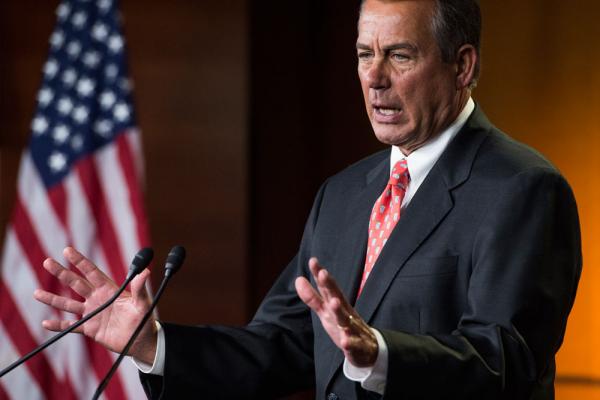I didn’t expect to leave a Friday night screening of Lincoln thinking about Jesus.
And I definitely didn’t expect the link to be an Italian political philosopher named Grigorio Agamben.
But of Lincoln’s many triumphs as an Oscar-season contender, its lasting effect is its surprisingly mature meditation on wisdom, freedom, and the necessity of employing the former when granted the latter.
Watching Lincoln reason aloud his justification for the Emancipation Proclamation, an act he admits to his advisors was dubiously legal at best, we encounter the film’s driving question: in a time of crisis when the rules no longer apply, what kind of moral vision do we want in leadership?
A low-cost, highly successful rural housing self-help program is at risk from both sides of the aisle. A year ago, the Sojourners article Seven Ways Home described:
the “mutual self-help” model, where families in rural America first qualify for a mortgage, then partner with seven to 11 other families who will all build their homes together.
The model first gained prominence in the Central Valley of California in the 1960s through the work of the American Friends Service Committee (AFSC). The Quaker group had listened to the housing dreams of migrant farm workers, many of whom lived in squalid conditions—30 families might share one rusty faucet. In response, AFSC offered the mutual self-help model: Families would work together to build their homes, with no one moving in until all the homes were completed. This built community as well as housing. The success of this model inspired the formation of Self-Help Enterprises, based in Visalia, California, which has helped more than 5,000 families build homes. The model has been so successful that today some self-help housing is sponsored by the USDA’s Rural Development program.
Now, the Daily Yonder reports that the program is under threat:
Self-Help Housing is unique among the panoply of federal programs. Under it, nonprofit housing developers provide training, technical assistance and close supervision to small teams of future owners who build their own homes. Each family invests roughly 1,200 hours, creating what's known as "sweat equity." Construction professionals do the rest. 502 direct loans finance the debt.
The average annual income of participant families is $27,000. Most are minorities. Their repayment record is better than higher income families.
The key to this success story is the assistance provided to participant families by nonprofits. But instead of increasing funding — or at least holding funding level — the Obama administration’s FY 2013 budget reduces funding for these groups by two thirds..
The House version cuts this program by half.
This classic, highly effective pairing of citizen initiative with governement aid shouldn't be undermined by short-sighted cuts.
Elizabeth Palmberg is an associate editor of Sojourners magazine.
I learned from an article in The Sun magazine that the word eccentric comes from a Greek word that describes objects in space that don't revolve around the earth. The Greeks in ancient times saw Venus, Mercury, Mars, Jupiter, and Saturn and observed that they wandered through the sky moving in a seemingly aimless way. They called these planets asteres planetai (wandering stars). The planets were not, however, wandering. They were revolving around the sun. It was the finite view of human beings that made them seem like wanderers.
Human eccentrics move in a seemingly aimless way, too. Their movements make them seem like wanderers to other human beings with finite views. They don't wander aimlessly, though. They revolve around a different center.
A federal court in Indiana has rejected atheists' requests to preside at wedding ceremonies, saying only clergy or public officials are licensed to solemnize marriages.
A lawsuit filed by the Indiana chapter of the Center for Inquiry argued that an Indiana law that requires marriages to be “solemnized” — made official by signing a marriage license — only by clergy, judges, mayors or local government clerks violates the Constitution.
But Judge Sarah Evans Barker of the U.S. District Court for the Southern District of Indiana ruled on Nov. 30 that marriage has religious roots. Therefore, government regulation of marriage is an act of religious accommodation — not endorsement — and protected by the Constitution.
I played the New York lottery for the first time last week.
My $2 ticket didn't win the $588 million payout – surprise, surprise – but it did buy me several minutes of musing, most of it instructive, some of it enjoyable.
I quickly ran out of spending ideas – slightly larger apartment, new computer, clothes for my wife, a car to replace the two we sold when moving to Manhattan. I realized I couldn't even spend the income on a lottery bonanza, unless I started buying things I don't need or particularly want.
...
In the end, I liked the idea of financial security, but saw little to be gained from sudden wealth. In fact, given the misery that tends to befall lottery winners, I might have dodged a bullet by not winning.
After this brief fantasy, I wondered more than ever why the wealthy work so hard to avoid taxes and other obligations of citizenship. Even though their effective taxes are lower than they were during the Reagan years and far lower than during the great prosperity of the post-World War II era, the wealthy are lobbying fiercely to pay even less in taxes. Once again, they seem willing to crash the government for everyone, rather than pay their share of its support.
Today, both progressive and conservative leaders from the business, law enforcement, and faith communities came together in Washington, D.C., during the two-day National Strategy Session to launch a new consensus around immigration reform.
Leaders launched the event with a press conference highlighting our broken immigration system — which affects all sectors of society — and urged immigration reform in 2013 that includes legalization and path towards citizenship.
There is some good stuff on the God’s Politics blog this week encouraging Christians to drop their concern about the “war on Christmas.” It’s a good idea. However, as we’re getting over our huff about “Happy Holidays,” we’d like to shift your attention to the real war on Christmas: the priorities of Washington politicians that are fundamentally at odds with the hope, love, joy, and peace celebrated by Christians during the Advent season.
As political leaders engage in negotiations to avoid the so-called “fiscal cliff,” we need them to preserve programs that reduce poverty and keep our families healthy. Unfortunately, House Speaker John Boehner and others in Congress are pushing to cut programs for the poor and vulnerable, while protecting tax breaks for the wealthiest Americans.
On Monday, three West Virginia bishops joined by families and advocates pressed the state's politicians to protect poor and working families — or, in other words, the “least of these” — during budget battles in Washington.
The budget and tax negotiations are complex and important. They're driven in large part by the expiring Bush tax cuts and steep across-the-board spending cuts set to kick in if Congress does not act.
Congressional Republicans have been demanding deep spending cuts in programs, including Medicaid and Social Security. They've also defended tax cuts for the wealthy. A number of religious figures say those priorities are backwards.
Felicia Thomas, 24, director at Fort Hill Child Development Center, spoke at the meeting. Thomas is a single mother of a five year old little girl. Federal programs like Earned Income Tax Credit and child care subsidies have allowed Thomas not only to pursue her dreams of a better future, but also to keep the lights on and the fridge stocked.
As I write, I'm stuck in the Central Wisconsin Airport (near the bustling metropolis of Wausau, Wis., for those keeping score at home). And, you guessed it, I'm waiting. Fog in Minneapolis prevented our plane from landing there, and now I'm left sitting in a very small regional airport with no restaurant and no coffee and no concrete sense of what the rest of my day will look like as I make my way to California. All I can do is wait.
I do know, barring something entirely unexpected, that I'll eventually make it to San Francisco. Right now I'm living the axiom offered by Tom Petty decades ago: "The Waiting is the Hardest Part."
Advent, a season during which Christians honor and attempt to approximate the longing for a Messiah more than 2,000 years ago, is often described as a chance to exercise our patience muscles. Advent can serve as a season of anticipation and hope and longing, void of desperation. This is Advent for those who already have most of that for which they wait. But for countless people around the globe, every additional day of waiting comes with a heavy price.






